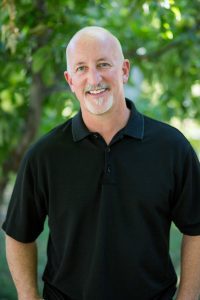One successful author’s advice from our archives remains timeless.
This excerpt has been updated from a 2012 interview.
Since this original interview from a few years back, James L. Rubart has gone on to make even more of his writing dreams a reality. He’s the best-selling, Christy Hall of Fame, Carol, INSPY, USA TODAY, and Romantic Times Book Review award-winning author of 16 novels, writing coach, audiobook narrator and owner of Second Mile Studios.
Setting the Goals that Will Make Your Writing Dreams a Reality
An Interview with James L. Rubart
by Lindy Jacobs
Some writers make it look so easy. Like Jim Rubart. In the short space of five years, Jim made the leap from new writer to the award-winning and best-selling author of Rooms, Book of Days, and The Chair.
Lindy Jacobs caught up with Jim between conferences and deadlines for a conversation about goals and the writing life.
LJ: We’re coming up to a brand-new year, and everyone is evaluating the past 12 months and making resolutions for the coming year. Jim, the accolades are stacking up. You really have accomplished a lot in the past eight years. Do you remember what it was like when you started your first book, Rooms? Did you set specific goals for yourself?
JR: Yes. Kind of. Here’s what I mean. The first step in the journey of any writer who is a follower of Jesus should be to find a big chunk of time (a whole day if possible) to spend with the Lord in solitude and ask a simple question: “What do You want me to write?” For some people it might be novels; for others, it could be devotionals; and for others, the absolute best thing may be writing a blog that reaches a specific audience. There’s this unspoken belief that the finish line for all writers is to pen a novel or nonfiction book. I don’t think that’s true.
First step, make sure you’re in sync with what the Lord is guiding you to write.
LJ: So, once you knew what you should be writing, did you give yourself deadlines? A set number of words a day?
JR: When I heard Jesus tell me to be a novelist, I made a goal of writing 20 minutes a day. Not a lot, but I knew I could do that. And I looked for opportunities to improve my craft and learn about the publishing world.
LJ: Did you go to writing conferences?
JR: Going to a conference should be every writer’s goal. That’s where the magic happens. Meeting agents, editors, and other writers, and watching the Lord set up divine appointments. There’s a big difference between staring at the lake from the shore and taking a swim. If writers are serious, they need to get in the water. (By the way, the OCW conference is one of the best I’ve been to, both on a spiritual level and craft level.) For years I set a goal of going to a writing conference and never acted on it. I had goals in other areas of my life and acted on them, but I never seemed to make it to that Seattle conference right in my backyard.
LJ: What held you back?
JR: Pure, unadulterated fear. I was scared to show anyone my writing. Scared I had no talent. Scared I’d be laughed at and waste their time and mine. But after going, I realized I was not alone. Every author I know had (and still has) self-doubt. If I may be so bold, aspiring writers need to realize this writing thing isn’t about them. If God has led them to write (and if they have a burning passion inside to write), then they need to step into obedience and step out, even though they are afraid.
LJ: Well said! Based on your own experience, what would you say are the most important things writers should focus on when getting started?
First, work at the craft. Hard. Treat it like getting a degree in medicine. Put in the hours. Study books like Fiction Writing for Dummies, Plot and Structure, Writing the Breakout Novel, and Self-Editing for Fiction Writers. Those are obviously fiction-focused since I’m a novelist—but there are excellent nonfiction books as well.
Second, get your writing out there for people to evaluate. Find a critique group. Enter contests. Submit your writing at conferences.
Third, find a mentor. Don’t force this. Let God set it up. It will happen in His time. I met Randy Ingermanson at a conference, and he became a significant mentor and encourager to me when there were still gallons of water behind my ears, but that relationship happened naturally. Now, I have a few people I’m mentoring. It’s a way to give back.
Fourth, write down what you want to accomplish. And put a date on it. By when will you finish your goal? The simple act of writing your action plan down will do wonders. Then, if you really want to go crazy, share your plan with a friend and put a dollar amount against it. “If I don’t do XYZ by this date _________, I will owe you ___ dollars.” I’ve done this. It works.
LJ: I’ve heard your novel Rooms inspired a small-group study guide with a workbook and even a DVD. So, it’s clear the readers of your books are significantly impacted by your stories and your characters’ journeys. Was this part of what God showed you when you sat with Him in the beginning? Was this His desire and goal for you? To write stories that reveal life-changing truth?
JR: I did pray about which story idea I should develop into a novel, but I didn’t set out to write a certain kind of story. I want to live with greater freedom. I want to be restored. I want to see Jesus heal people’s deep wounds and see them step into their destiny. A friend once said every pastor has only one sermon, and they keep preaching it year after year using a different approach. What I’ve described above is my sermon, so all of my books will have a theme of freedom, restoration, and destiny. So I write what’s pounding around inside my heart and mind and leave it up to the Holy Spirit if it’s going to impact someone or not.
LJ: Your themes of healing, restoration, and forgiveness are not new, but you seem to deliver them in a unique way that resonates. Where do you get your story ideas, and how do you develop them?
JR: Too many comic books as a kid! Seriously, it’s just the way my brain works. But I do believe it can be taught. I will be teaching an intensive coaching class on how to create unique ideas that carry spiritual weight at the OCW conference in August 2019.
LJ: Thanks for sharing your wisdom with us.
JR: My pleasure! Can’t wait for the conference next summer. I believe Jesus will work powerfully in people’s lives.
 James L. Rubart believes he is 28 years old but lives trapped inside an older man’s body. He thinks he’s still young enough to water ski like a madman and dirt bike with his two grown sons. He’s the best-selling, Christy Hall of Fame, Carol, INSPY, and Romantic Times Book Reviews award-winning author of 16 novels and loves to send readers on mind-bending spiritual journeys they will remember months after they finish one of his stories. He’s also a branding expert and audiobook narrator. He lives with his amazing wife on a small lake in eastern Washington.
James L. Rubart believes he is 28 years old but lives trapped inside an older man’s body. He thinks he’s still young enough to water ski like a madman and dirt bike with his two grown sons. He’s the best-selling, Christy Hall of Fame, Carol, INSPY, and Romantic Times Book Reviews award-winning author of 16 novels and loves to send readers on mind-bending spiritual journeys they will remember months after they finish one of his stories. He’s also a branding expert and audiobook narrator. He lives with his amazing wife on a small lake in eastern Washington.
Jim will teach a coaching class on “Recording Your Own Audiobooks” and mentor at the upcoming 2023 Cascade Christian Writers Conference.








